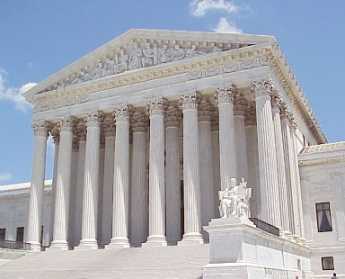Related Topics
Philadelphia Legal Scene
The American legal profession grew up in this town, creating institutions and traditions that set the style for everyone else. Boston, New York and Washington have lots of influential lawyers, but Philadelphia shapes the legal profession.
Academia in the Philadelphia Region
Higher education is a source of pride, progress, and aggravation.
Robert H.Bork Upsets A Century of Antitrust Law
According to the late Robert H. Bork, it ought to be fairly easy to identify price-fixing, because legitimate cases that harm the consumer by price manipulation aren't common, or may not even exist. With this, Bork convinced the judiciary to abandon a century of contrary belief while still a young law professor, thus establishing his own reputation with Ronald Reagan. He was appointed Solicitor General by Richard Nixon, unfortunately thus embroiling himself in Nixon's impeachment.
The Supreme Court Gets Fed Up With Professors

|
| Supreme Court |
In March 2006, years later, the Supreme Court, like a sleeping alligator, suddenly clamped its jaws on the whole Ivy League. Unanimously and without explanation, the Court told Universities they could not block the U.S. Armed Forces from recruiting on their campuses. A number of Ivy League Universities, in this case, the Yale Law School, had turned away Army recruiters because the Professors were offended by the Army's "don't ask, don't tell" policy on homosexual soldiers. The Supreme Court didn't even consider the reasons for the University's' policies, although private opinions of the Court conservatives could readily be imagined. The Court would not even dignify the matter with the thunderous phrases about first principles which otherwise might have seemed tempting. The Chief Justice signed the order, the Court unanimously agreed, and that's as final as you are going to get, for a show of power.
About a month earlier, things had seemed to be going the other way. The Harvard Faculty had forced out their president, Lawrence Summers because he violated their idea of politically correct speech. Quite significantly, two-thirds of the students took the side of Summers in the dispute, a warning that the faculty was getting itself into an isolated position. And if you look back, the nation had divided when it twice elected the younger George Bush, support for East Coast urban elitism was likely coming to the end of a fifty-year dominance of American life. Not to put too fine a point on it, the country was getting tired of the bitter-end Vietnam War protesters, now entrenched in academic strongholds like Robert the Bruce. It may well be that the country was irked by expensive gasoline, French disloyalty, and Middle East intransigence, while the Legal profession was having a private quarrel. Clever of the Chief Justice to allow people to think what they pleased. The Constitution directs the Armed Forces to defend us; interfering with recruitment is at best impertinent, at worst imperils the nation.
The Supreme Courts of the various states and the U.S. Supreme Court within the federal court system retain the power of administration of all the courts which report to them, but they rarely exercise that power actively. As the number of judges has increased significantly in the past thirty years, public oversight of the selection or election of judges has been stretched to the vanishing point. The result has been a strengthening of political control over the courts, a lessening of the quality of the judges themselves, and a growth of the influence of law schools. The same parade of professors keep appearing as friends of the court, the metropolitan newspapers can always count on them for Op-Ed pieces on difficult topics. Their opinions begin to surface as their graduates start to enter law practice. Slowly and relentlessly, the viewpoints of faculty members of the five prestige law schools have come to challenge, and sometimes to up-end, the rigidly organized opinions, right or wrong, of judge-made law. When it reaches the point where law schools can blithely block the ability of the armed forces to defend the country from foreign attack, it is past time to do something about it.
Some things never change. But this is going to change, and soon.
Originally published: Thursday, June 22, 2006; most-recently modified: Monday, June 03, 2019